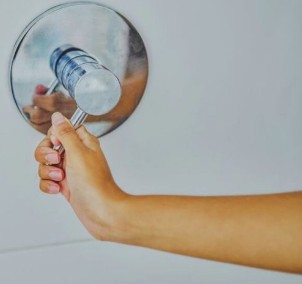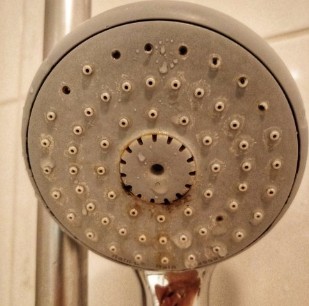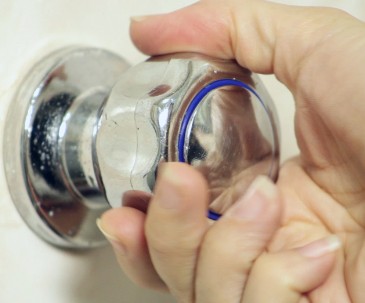So, you have been looking forward to a refreshing shower the entire day, but then you walk into your bathroom only to find out your shower knob turns, but no water is coming out. This will not only leave you annoyed but with a problem that needs fixing on your hands.
The reasons a shower knob turns, but water is not coming out include a damaged shower valve, showerhead problems, and shower knob or handle issues. Also, issues with water pressure can cause this problem.
Before calling a plumber, try troubleshooting and fixing the problem yourself because most of these issues can be resolved through DIY.

Why Is My Shower Knob Turns But No Water Comes Out? (Causes & Fixes!)
| Problem | Causes | Recommended Fixes | |
| 1. | Shower Knob or Shower Handle Issues | Overly tightened or misaligned knob or handle A loose knob or handle Clogging The buildup of hard water | Clean or replace the knob or handle |
| 2. | Damaged Shower Valve | Mineral buildup Wear and tear | Clean or replace the valve |
| 3. | Poor Water Pressure | Closed shut-off valve Plumbing issue | Fully open the shut-off valve Hire a plumber |
| 4. | Damaged Diverter Valve | Debris accumulation Wear and tear | Clean the diverter valve Replace it |
| 5. | Showerhead Problem | Mineral buildup | Clean the showerhead Replace it |
| 6. | Worn-Out Shower Set | Prolong use | Replace it |
1. Shower Knob or Shower Handle Issues
The issue may be with the knob or handle. An excessively tightened shower knob or handle, misaligned, or loose one, may keep turning without facilitating water flow. It may also malfunction because of a buildup of hard water or a clog.
Fix
Clean the shower knob or handle by detaching and soaking it in water and vinegar solution for around an hour. After that, remove deposits using a scrub brush or toothbrush, then reattach it.
If the knob or handle is too damaged, do this to replace it.
- Stop water flow
- Remove the knob’s decorative trimming using a flathead screwdriver or utility knife
- Unscrew and remove the old shower knob or handle. Turn the screw counterclockwise
- Install the replacement shower knob or handle, then tighten the screw
- Restore water flow and test the new knob or handle
2. Damaged Shower Valve
The temperature and flow of water in your shower are controlled by the shower valve, so it needs to be in proper condition for you to enjoy a pleasant shower. Unfortunately, a shower valve undergoes wear and tear or gets damaged prematurely. Also, mineral buildup can cause problems.
Fix
Remove and clean the valve if clogged with a cleaning solution explicitly made for shower valves or vinegar.
Here’s how to replace a shower valve
- Stop the water supply
- Put a washcloth over the shower valve to avoid losing screws
- Unscrew and take off the shower handle
- Remove the screws securing the trim plate to the bathroom wall
- Scrape off the caulk around the trim plate and remove it
- If the opening on the wall is less than 12 by 12 inches, enlarge it
- Use needlenose pliers to take out the shower valve clip
- Pull out the valve using pliers
- Put in the replacement shower valve and then the clip
- Restore water supply to check for any leaks
- Install the trim plate, then the handle

3. Poor Water Pressure
Water might not flow to your shower if the pressure is too low. Depending on the cause, you may be able to fix the issue through a few tweaks, or it may require a professional touch
Fix
- Turn the showerhead’s knob left until you get to the end
- Ensure the shut-off valve is fully open
- Hire a plumber
4. Damaged Diverter Valve
This component’s sole responsibility is to facilitate water transfer to the showerhead via the pipeline, so it’s safe to say it’s a fundamental piece of the shower. If damaged, it leads to a drop in the water pressure, and eventually, the water flow to the showerhead will stop.
Fix
- Stop the water supply
- Detach the malfunctioning diverter valve
- Remove debris from the diverter valve using a tiny brush or toothbrush, then re-install it. If this doesn’t fix the issue, buy a replacement diverter valve
- Follow the provided instructions to put in the replacement diverter valve. Refer to any available diagrams
- Restore the water supply, then test the new valve
5. Showerhead Problem
Mineral buildup can block the holes of the showerhead, preventing water from coming out. Over time, this component’s internal parts wear off, making the showerhead unusable.
Fix
- Clean a clogged showerhead using a rag and CLR or vinegar. Remove tough gunk by scrubbing it off with a brush.
- If the problem persists, replace the showerhead
- Stop the water supply
- Unscrew, then get out the showerhead
- Install a new showerhead, making sure you screw it properly, ensuring it’s tight enough but not too tight
- Restore the water supply, then examine the shower for leaks

6. Worn-Out Shower Set
Your shower components are subjected to wear and tear as you continue using your shower. Therefore, consider installing a new set if you’ve had the same shower without making any replacements.
This may seem like a daunting, time-consuming job, but it is doable, provided you are willing to get the job done and have the necessary skills. Follow these steps:
- Cut the flow of water. To do so, disable the shut-off valve close to the shower set. Alternatively, turn off your home’s main valve
- Unscrew and take out your current shower set’s elements, like the handle, knob, and trim
- Install the shower set you just bought. Ensure everything component is well positioned and screwed correctly
- Restore water supply
Final Remarks on Shower Knob Turns But No Water
As you can evidently see, this is an issue you can resolve yourself with a couple of tools, proper troubleshooting, and following the correct procedure. Also, always purchase high-quality, compatible replacement parts. Before doing any replacements or repairs, ensure your home’s main valve and bathroom’s shut-off valve are fully open.
Also, read: How To Fix A Broken Shower Handle Stem
